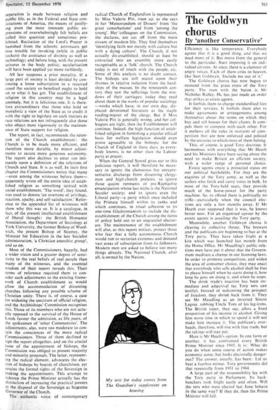The Goldwyn chorus
By 'another Conservative'
Efficiency is like temperance. Everybody agrees that it is a good thing, and that we need more of it. But move from the general to the particular. Start imposing it on indi- vidual citizens. At once, there is a clamour of angry voices. Each of them cries to heaven, like Sam Goldwyn. 'Include me out of it.'
The Goldwyn chorus has now begun to resound from the grass roots of the Tory party. The man with the baton is Mr Nicholas Ridley. He has just made an order that strikes at estate agents.
It forbids them to charge standardised fees for their services. It forbids them also to make agreements or arrangements among themselves about the terms on which they buy and sell houses for their clients. It com- pels them to compete with-each other. For it outlaws all the rules in restraint of com- petition that are now enforced and policed by the societies to which most of them belong.
_This, of course, is good Tory doctrine. It harmonises with everything that Mr Heath and his Ministers have been saying about the need to make Britain an efficient society, with a wider range of personal choice.
Estate agents enjoy a protected status on our political battlefields. For they are the esquires of the Tory army, as well as the sutlers who fetch and carry votes in bulk. In most, of the Tory-held seats, they provide much of the horse-power for the party machine. So, to offend them is politically no trifle—particularly when the council elec- tions are only a few months away. If Mr Heath ever supposed that it was, he knows better now. For an organised uproar by the estate agents is assailing the Tory party.
Meanwhile, another Goldwyn chorus is clearing its collective throat. The brewers and the publicans are beginning to bay at the Tory party. They have taken fright at a kite which was launched last month from the Home Office. Mr Maudling's public rela- tions men have put it about that the Govern- ment meditate a change in our licensing laws. In order to promote competition, and widen the area of consumer choice, they may enact that everybody who sells alcohol shall be free to please himself when he starts doing it, how long he goes on doing it, and when he stops.
The drink trade's reaction has been im- mediate and adjectival (as Tory Mrs can testify). Instead of welcoming the prospect of freedom, they shrink back from it. They see Mr Maudling as an inverted Simon Legree, robbing Uncle Tom of his leg-irons. The British toper, they say, allots a fixed proportion of his income to alcohol. Giving him more time in which to spend it will not make him increase it. The publican's over- heads, therefore, will rise with free trade, but the takings will stay put.
Here is Mr Heath's option. In one form or another, it has confronted every British Prime Minister since 1945. It is: What do you do when some course of action makes economic sense, but looks electorally danger- ous? The answer, usually, has been: Let us beat a fearless retreat. Tory governments did that repeatedly from 1951 to 1964.
A large part of the responsibility lay with the Tory party in Parliament. Its back- benchers took fright easily and often. Will the tars who were elected last June behave in the same way? If they do, then the Prime Minister will fail.










































 Previous page
Previous page